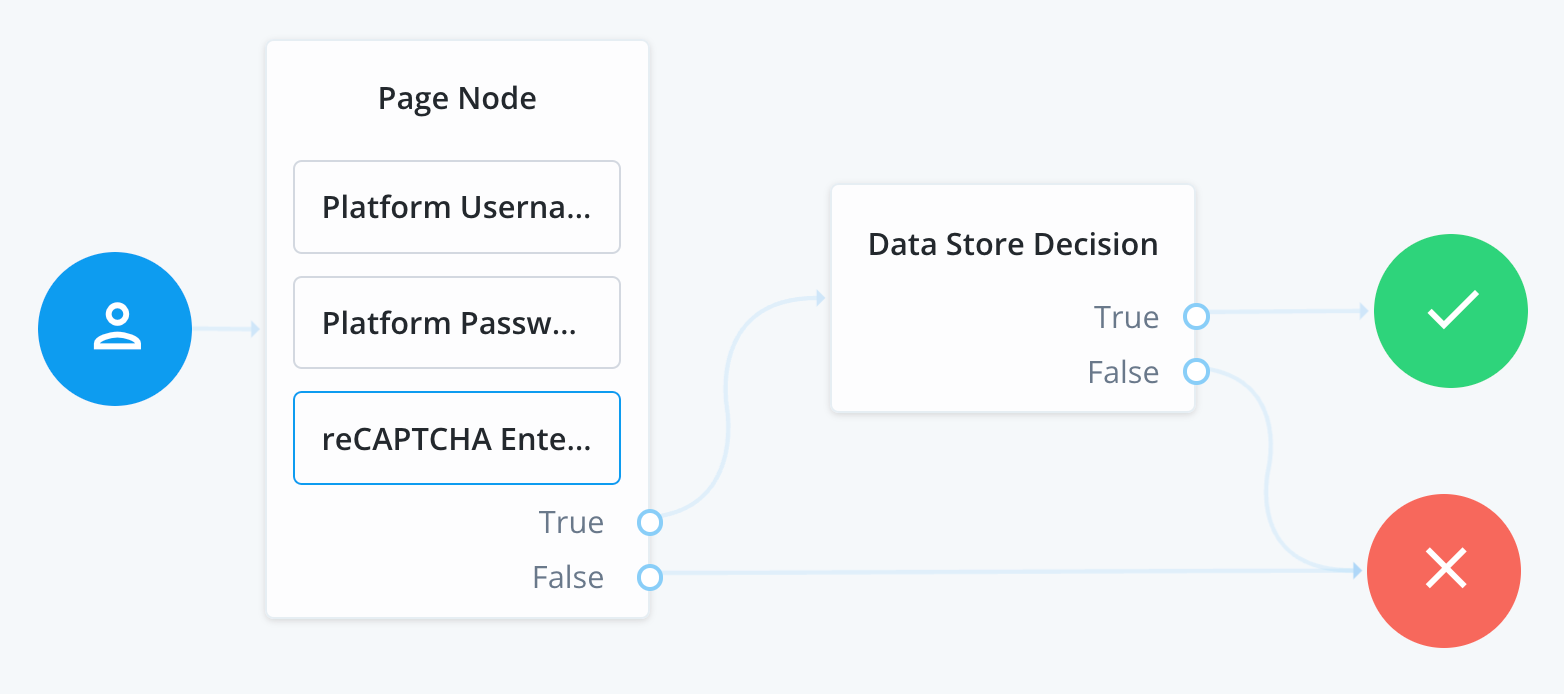reCAPTCHA Enterprise node
The reCAPTCHA Enterprise node adds Google reCAPTCHA Enterprise support to your journeys.
Google reCAPTCHA Enterprise offers improvements over previous versions, including more granular scores, reason codes for events deemed higher risk, Web Application Firewall (WAF) support, and native support for Android and iOS.
Compatibility
| Product | Compatible? |
|---|---|
Advanced Identity Cloud |
Yes 1 |
PingAM (self-managed) |
Yes |
Ping Identity Platform (self-managed) |
Yes |
1 Currently available only in the rapid release channel.
|
This node only supports Google reCAPTCHA Enterprise. For reCAPTCHA v2 and v3 support, and hCaptcha support, use the CAPTCHA node. |
Inputs
This node reads an optional CaptchaEnterpriseNode.PAYLOAD variable from shared state.
Use this variable to customize the payload the node sends to the Google reCAPTCHA Enterprise server for assessment.
You can set the value by using a Set State node, or by using a Scripted Decision node, using a script similar to the following:
var username = nodeState.get("username");
var customPayload =
JSON.parse(`{"userInfo": {"accountId": "${username}"}}`);
sharedState.put("CaptchaEnterpriseNode.PAYLOAD", customPayload);
outcome = "true";To learn more about the payload, refer to Project Assessments - Event in the Google Developer documentation.
Dependencies
You need to sign up for access to the reCAPTCHA API to get the API key pair required to configure the node.
Configuration
| Property | Usage |
|---|---|
Google Cloud project ID |
The ID of the project that has Google reCAPTCHA enabled. You can get the ID of your project in the Google Cloud console. For example, |
reCAPTCHA Site Key (required) |
The ID of the reCAPTCHA key you created in the Google Cloud console. The key can be for any platform type, Sometimes referred to as a key ID in the Google Cloud console and documentation. |
reCAPTCHA API key secret identifier |
An identifier used to create a secret label for mapping to your Google reCAPTCHA API key in a secret store. Get or create your API key from the Google Cloud Console under APIs and Services > Credentials. The secret label takes the form The identifier can only contain alphanumeric characters |
Score Threshold |
The score threshold for determining if a user is likely to be a real person. reCAPTCHA scores are between If the returned score is equal to or greater than the threshold the journey continues along the To learn more, refer to Interpret scores in the Google documentation. |
Store reCAPTCHA assessment JSON |
Stores the assessment response JSON for future reference within the journey. The node stores the JSON response in the |
Store reCAPTCHA error messages |
Stores the error messages for future reference within the journey. The node stores the error messages in the The error consists of an error code and description of the error. View the possible error codes
|
reCAPTCHA CSS class |
A CSS class to apply to the HTML elements reCAPTCHA adds to JavaScript apps. The default is |
reCAPTCHA Verification URL |
The URL to send the reCAPTCHA to for verification. Only change this if Google updates the URL used for reCAPTCHA verifications. The default is |
JavaScript reCAPTCHA API URL |
The URL of the JavaScript file containing the reCAPTCHA API. Only change this if Google releases a new version of the JavaScript reCAPTCHA API. The default is |
Outputs
If you enable the Store reCAPTCHA assessment JSON property, the node outputs the reCAPTCHA assessment response JSON in a state variable named CaptchaEnterpriseNode.ASSESSMENT_RESULT.
If you enable the Store reCAPTCHA error messages property, the node outputs the error response JSON in a state variable named CaptchaEnterpriseNode.FAILURE.
Outcomes
True-
The reCAPTCHA response was successfully verified.
False-
The reCAPTCHA response wasn’t verified or failed verification.
Example
The following journey uses a Page node and a Data Store Decision node to collect and verify the credentials and a CAPTCHA response:

This example uses the following nodes:
-
The Page node prompts the user to input their username and password:
-
The Platform Username node collects the username and stores it in the shared state.
-
The Platform Password node collects the password and stores it in the shared state.
-
The reCAPTCHA Enterprise node collects and verifies the reCAPTCHA Enterprise response.
-
-
The Data Store Decision node uses the username and password to determine successful authentication.